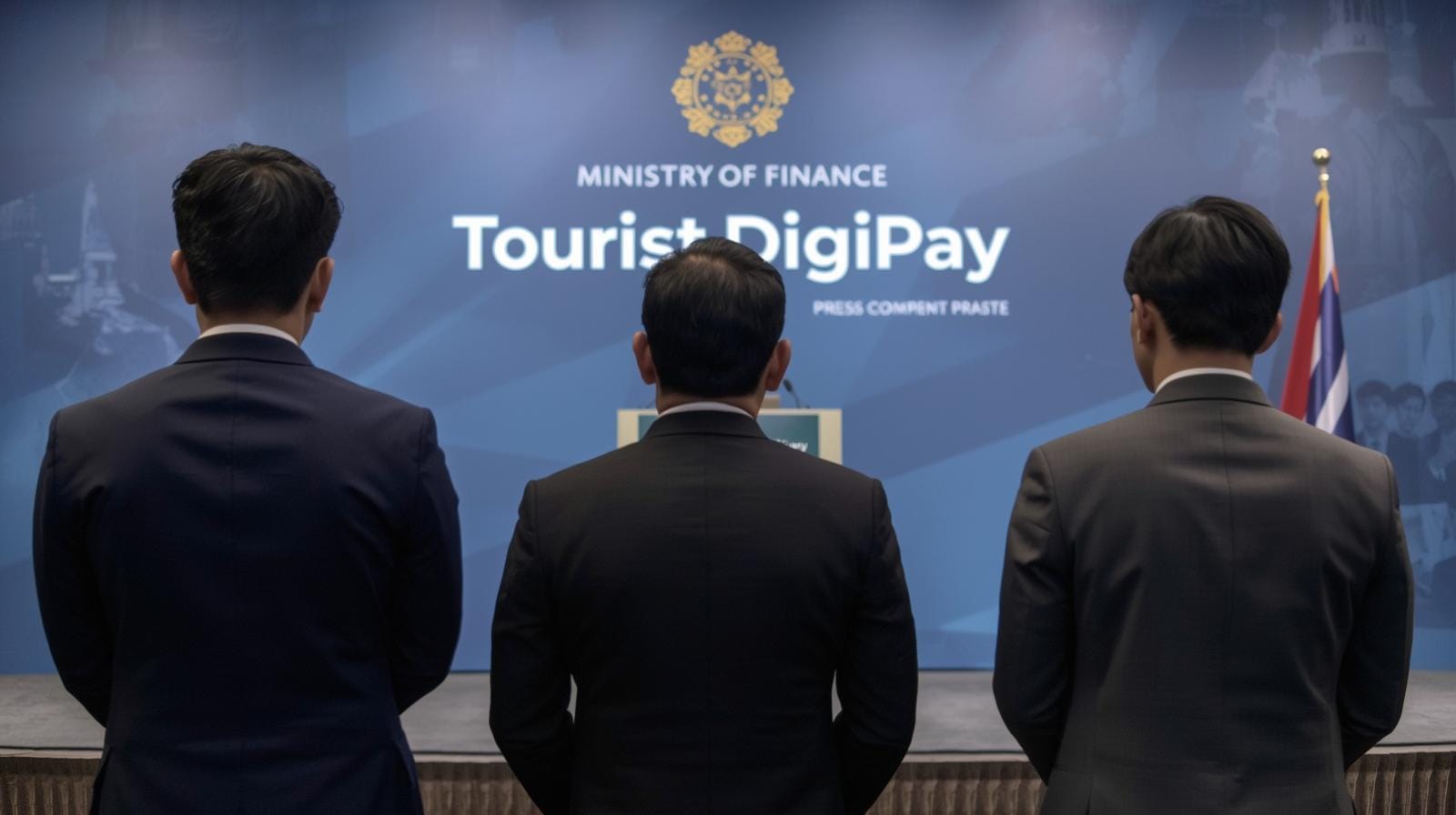The initiative – announced Aug 18, 2025 – aims to boost tourism spending via Thailand’s ubiquitous QR system. Tourists deposit assets at licensed exchanges; funds convert to baht and load into e-wallets (usable by PromptPay). The scheme comes with strict KYC/AML checks and capped withdrawals, and is explicitly meant to rejuvenate a sector still below its 2019 peak.
“This is the world’s first model that doesn’t use crypto directly as a payment medium, but converts it to Thai baht for use through e-money,” Finance Minister Pichai Chunhavajira said at the launch. He argues TouristDigiPay will benefit small retailers – unlike foreign schemes that only tie crypto to credit cards at big stores – by letting vendors accept baht via normal PromptPay transactions.
In practice, TouristDigiPay works like a specialized e-wallet top-up. Travelers sign up with an SEC-licensed crypto platform and a BOT-regulated bank or e-money provider, depositing assets or cash. These are immediately converted to baht at market rates and credited to a digital wallet. Tourists then pay vendors by scanning a PromptPay QR code or similar gateway. Crucially, only the converted baht (not crypto itself) changes hands, avoiding volatility issues and integrating with Thailand’s widely-adopted QR network.

Despite the crypto angle, operators must obey tight rules. Participants undergo full KYC/CDD checks under AMLO standards. Only foreign tourists on short-term stays are eligible; Thai residents or long-term visa-holders aren’t covered. Spending is limited: at each small merchant (e.g. street food stall or 7-Eleven), a tourist can only spend up to 50,000 THB per month, while at larger outlets (hotels, restaurants with card terminals) up to 500,000 THB per month. No cash withdrawals are allowed until a tourist closes the e-wallet, and transactions at high-risk merchants are barred. As The Nation notes, all funds must clear anti-money-laundering checks – tourists must even show proof of where their crypto or cash came from.
“Only foreign tourists temporarily staying in Thailand will be eligible to use the service,” a government summary states. By design TouristDigiPay sidesteps traditional banking hurdles for visitors. Recent Thai regulations have tightened account access – in 2025, “almost every major Thai bank stopped opening accounts for tourists”– so the new system links crypto platforms directly to e-wallets. Industry analysis suggests major players could plug in: SCB 10X’s Rubie wallet (for stablecoin-baht swaps), KBank’s TAGTHAi QR service, TrueMoney/ShopeePay wallets and others are expected to participate. In effect, banks and e-money apps become the back-end providers of TouristDigiPay, with PromptPay as the payment gateway.
The economic aim is clear: more spending. Thailand’s 2025 tourist forecast was cut to ~33 million (well under the 39.9 million record of 2019). Officials hope even a small per-person lift adds up. The Finance Ministry projects that if each visitor spends just ฿5,000 more, national spending could rise 10%, or roughly ฿175 billion extra. In other words, TouristDigiPay is pitched as a growth lever for a sector that still hasn’t fully recovered.
“Developing the digital economy alongside tourism will create economic opportunities and attract more tourist spending in Thailand…” Finance Permanent Secretary Lavaron Sangsnit said at the press event. If a Western backpacker spends on street food via QR rather than paying cash in USD, the logic goes, everyone – merchants and the state – gains.
Operationally, rolling out TouristDigiPay faces challenges. Tourists must learn the onboarding (KYC, app downloads) and hope merchants actually display QR codes. However, Thailand’s ubiquity of QR payments helps: even small vendors already accept PromptPay. As one review noted, unlike overseas crypto cards tied only to malls, this system “expands beyond the large retailers…including street food vendors and convenience stores”. In practice, that could mean any cafe, taxi or market stall becomes a potential outlet for crypto-derived baht. If key islands and tourist districts embrace it, the convenience could translate to real spending gains.
TouristDigiPay also dovetails with Thailand’s broader visa reforms. The country recently introduced a 5-year “Destination Thailand Visa” for digital nomads and a new 10-year Long-Term Resident (LTR) visa for professionals. Digital nomads on DTV or LTR visas stand to benefit from easier spending – but paradoxically, until TouristDigiPay, their banking access was restricted: “tourists (including DTV holders) are no longer eligible” for new Thai bank accounts. In this sense the crypto scheme is a workaround. Likewise, any newly arrived expat using TouristDigiPay still has to navigate visa rules. (For a refresher on the latest Thai visas and compliance risks, see Locked Out in Paradise and Thailand’s Visa Overhaul 2025.)
Meet Breeze — the easiest way to stay online in Thailand.
No plastic SIMs. No queues. Just instant data when you land.
Skip the airport SIM hunt. With Breeze eSIM, you’re connected the moment you arrive. Choose your plan, scan your QR, and enjoy fast data across Thailand — prepaid, secure, and hassle-free.
Travel smarter. Stay connected with Breeze.
Regulatory Safeguards and Skepticism. The sandbox status of TouristDigiPay allows authorities to monitor outcomes. They have already flagged future expansion: Lavaron hinted post-launch that if the trial succeeds, limits could rise beyond ฿550,000, even allowing purchases of high-ticket items like real estate. At the same time, safeguards are built-in. Banks and crypto platforms will use blockchain forensic tools or equivalent to verify funds. Transactions above ฿450,000 must be reported with purpose. And because payments flow through registered e-wallets, AMLO can trace funds to passports and visas.
Yet questions linger. With many Thai-friendly tourist visas still short-term, will visitors handle these hoops? A typical vacationer might balk at multiple app installations and paperwork. Crypto volatility is another factor: tourists risk losing purchasing power if markets swing before conversion. On the other hand, the scheme protects Thai businesses: merchants see only baht, not jarring price swings. Unlike more libertarian crypto solutions, TouristDigiPay keeps the baht – and Thai regulators – in the driver’s seat.
Finally, TouristDigiPay could be a pilot for a broader “Tourist Wallet”. The Bank of Thailand has indicated plans for an official e-wallet for foreign visitors, possibly linking their domestic payments to international cards in future. For now, TouristDigiPay is the testbed. If it works, Thailand may extend it to more visitor categories or even bring in stablecoins (Lexology analysts note Bangkok Bank’s earlier trials with a baht stablecoin). But if it flops – or if tourists don’t adopt crypto – the government could scrap the program after 18 months.

In any case, Thailand’s experiment will be watched globally. Other nations (from Hong Kong to the UAE) are eyeing crypto for tourism, but Thailand’s route – convert-then-spend – is novel. It reflects both opportunity and caution. Whether tourists embrace the convenience, or see it as too cumbersome, remains to be seen. For now, the scheme is a confident bet: if Thailand can make crypto easy to spend, it might just boost the wallets of street vendors and hoteliers alike.
Figure: Sunset over a beach in Krabi, one of Thailand’s top tourist destinations. The TouristDigiPay trial hopes to channel more foreign currency (via converted crypto) into local economies like this. (Photo: Sanan Srihirun/Reuters) Alt: Golden-hour view of Andaman Sea beaches in Krabi, Thailand.
The Thailand Advisor: We see our readers as active participants in Thailand’s story. This report is data-driven, fact-checked, and written by expats like you. Stay engaged, stay informed, and subscribe for full access – we’re in this together.
Read next: Thailand’s Visa Overhaul 2025: 17 Categories Down to 7 — What Really Changes for Expats.
Meet Breeze — the easiest way to stay online in Thailand.
No plastic SIMs. No queues. Just instant data when you land.
Skip the airport SIM hunt. With Breeze eSIM, you’re connected the moment you arrive. Choose your plan, scan your QR, and enjoy fast data across Thailand — prepaid, secure, and hassle-free.
Travel smarter. Stay connected with Breeze.







